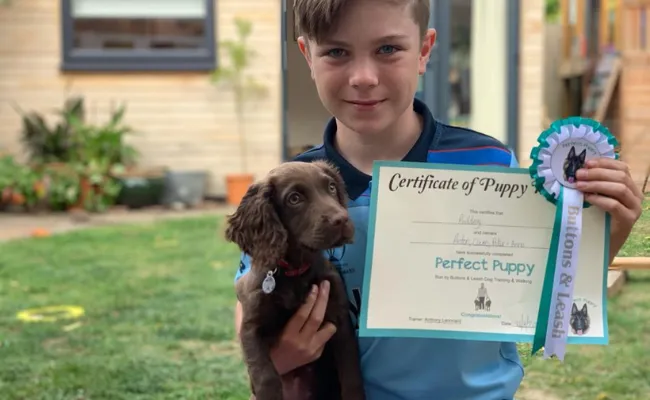Kids Around Dogs
Helping kids overcome their fear of dogs.
Kids Around Dogs
Helping kids overcome their fear of dogs.
Kids Around Dogs
KAD - Kids Around Dogs® is an award winning association of Dog Professionals and Child Care Professionals who specialise in working with families and schools to help children and dogs to live in harmony together.
As a child, I had a very scary experience with a neighbours dog that for years left me scared when around dogs. Thankfully, I managed to overcome this fear thanks to a friends dog. This experience showed me how difficult life can be when you are worried about dogs, particular when you are a child.
That is why I enrolled with Kids Around Dogs who offer a specifically designed program to help kids overcome their fear of dogs.






"Anthony is a great guy. Very calm and speaks the 'kids' language. He is very patient and takes all anxieties into consideration. Our child was petrified of being within meters of any dog. Anthony built her confidence by transferring his knowledge and confidence skills to her. Now she can pass a dog in the street without a second thought. She can visit family and friends with dogs and even have a snuggle with them!! Thank you so so much!! We are forever grateful!"
Liza
The Program
This program is designed to help kids overcome their fear of dogs.
This program consists of 8 x 20 - 30 minute training sessions. These can be a mixture of in-person and online. This is down to you and your kids preference.
The first 6 sessions, involve learning about dogs body language, how to approach them and how to safely interact with them. Age specific homework will be given to help with the program.
The final 2 sessions, will usually involve meeting a real-life dog, in this case it will be my dog Tywin.
Further sessions can be purchased if needed.
Kids Around Dogs Program Price
KAD
£200
8 Training Sessions
Payment plans available on all training programs
Kids Around Dogs Program Price
KAD
£200
8 Training Sessions
Payment plans available on all training programs
Kids & Dogs Advice

Why Using Punishment Doesn't Work in Dog Training
Why Using Punishment Doesn't Work in Dog Training
Introduction
Dog training has come a long way from the days of dominance-based techniques, which often relied on punishment as a primary tool for behaviour modification. Modern dog training methods are rooted in positive reinforcement and science-based principles, emphasising the importance of building a strong, trusting bond between you and your dog. In this blog post, we will explore why using punishment doesn't work in dog training and why positive reinforcement is a more effective and humane alternative.
Trust and Relationship Building
One of the key reasons why punishment-based training is ineffective is that it erodes the trust between you and your dog. Dogs are highly social animals, and they thrive on positive interactions and a strong bond with their owners. When a dog associates training with fear, pain, or discomfort, the relationship becomes strained, and the dog may become anxious or fearful around their owner. This hinders the learning process and can lead to long-term behavioural issues.
Fear and Anxiety
Punishment-based training methods often involve aversive techniques such as yelling, physical corrections, or shock collars. These methods can instil fear and anxiety in your dog, which can have serious consequences for their mental and emotional well-being. A fearful dog is less likely to learn and can become more unpredictable, as they may react defensively to perceived threats.
Inhibition of Natural Behaviours
Punishment-based training suppresses unwanted behaviours but does not address the underlying causes. Dogs may stop displaying certain behaviours out of fear, but they may not understand why the behaviour is inappropriate. This inhibition can lead to pent-up stress and frustration, potentially resulting in the development of other problem behaviours.
Lack of Clarity
Dogs learn best when they understand what is expected of them. Punishment-based training often lacks clarity, making it challenging for dogs to discern the desired behaviours. Positive reinforcement, on the other hand, rewards and encourages the behaviours you want, making the training process more intuitive and enjoyable for your dog.
Short-Term Gains, Long-Term Consequences
Punishment-based training might yield quick results, but these gains are often short-lived. The underlying issues are not addressed, and the dog's anxiety or fear can resurface at any time. Positive reinforcement training focuses on teaching your dog good behaviours and reinforcing them consistently, leading to lasting results.
Ethical Considerations
From an ethical standpoint, many dog owners find punishment-based training methods troubling. Using physical or psychological discomfort to control your dog can harm their overall well-being and negatively impact your relationship. Modern dog training is moving away from such methods in favour of more compassionate and humane approaches.
Conclusion
In the world of dog training, it's becoming increasingly clear that punishment-based methods are ineffective and counterproductive. They erode trust, foster fear and anxiety, inhibit natural behaviours, lack clarity, and offer short-term gains at the expense of long-term consequences. Instead, positive reinforcement training is the way forward. This method is not only more effective but also more humane, helping you build a strong and positive relationship with your four-legged friend while achieving lasting results. By opting for positive reinforcement, you can ensure that your dog's training experience is a joyful and rewarding one.

